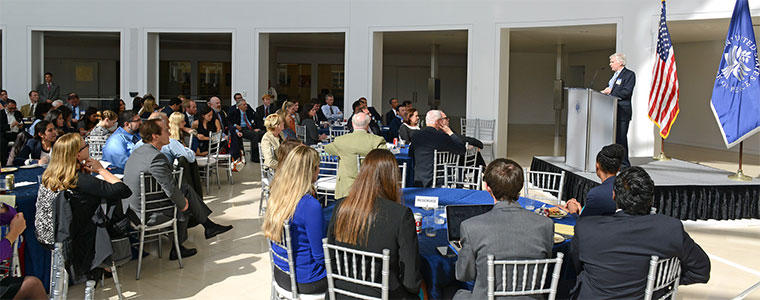Risk, Recruitment and Retention: Engaging Foreign Publics in High Threat Environments
On October 24, the U.S. Institute of Peace, the U.S. Advisory Commission on Public Diplomacy, the McCain Institute and the Truman National Security Project-Center for National Policy convened a non-partisan meeting with senior diplomatic, military, media and NGO leaders on assessing civilian risk and engagement in diplomacy.

In an era where "zero-risk" environments abroad no longer exist, how does the United States address the question of risk for American civilians who want to pursue productive careers in diplomacy and development? With non-state actors increasingly shaping the international system, how can American diplomats and development workers engage effectively in environments critical to the defense of U.S. national interests in the 21st century? And how do we recruit, retain and support a new generation of men and women to do so?
USIP, the U.S. Advisory Commission on Public Diplomacy (ACPD), the McCain Institute and the Truman National Security Project-Center for National Policy were pleased to host a special non-partisan meeting on October 24 where diplomatic, military, media and NGO leaders from government and the private sector joined forces for a discussion on these issues and more. Continue the conversation on Twitter with #FrontlineCivilians.
Please see the agenda for the full list of speakers. Featured speakers and moderators included:
- Ambassador Ryan C. Crocker
Dean and Executive Professor, The Bush School of Government & Public Service, Texas A&M University
Member, Broadcasting Board of Governors
Former U.S. Ambassador to Afghanistan, Iraq, Pakistan, Syria, Kuwait, and Lebanon - Admiral James G. Stavridis, USN (Ret)
Dean, The Fletcher School, Tufts University
Former NATO Supreme Allied Commander Europe and Commander, U.S. European Command - Ambassador James F. Jeffrey
Philip Solondz Distinguished Visiting Fellow, The Washington Institute
Former Deputy National Security Advisor and U.S. Ambassador to Iraq and Turkey - Ambassador William B. Taylor, Jr.
Acting President, U.S. Institute of Peace
Former Special Coordinator for Middle East Transitions, U.S. Department of State, and U.S. Ambassador to Ukraine - William J. Hybl
Chairman, U.S. Advisory Commission on Public Diplomacy - Ambassador Kurt Volker
Executive Director, The McCain Institute for International Leadership
Former U.S. Ambassador to the North Atlantic Treaty Organization (NATO) - The Hon. Doug Wilson
Chairman, Board of Advisors, Truman National Security Project-Center for National Policy
Former Assistant Secretary of Defense for Public Affairs, U.S. Department of Defense - Ambassador Frederick Barton
Former Assistant Secretary for Conflict and Stabilization Operations, U.S. Department of State - Jean E. Manes
Principal Deputy Coordinator for International Information Programs, U.S. Department of State - Michael Crowley
Chief Foreign Affairs Correspondent, TIME Magazine - Matthew Rosenberg
Foreign Correspondent, The New York Times



